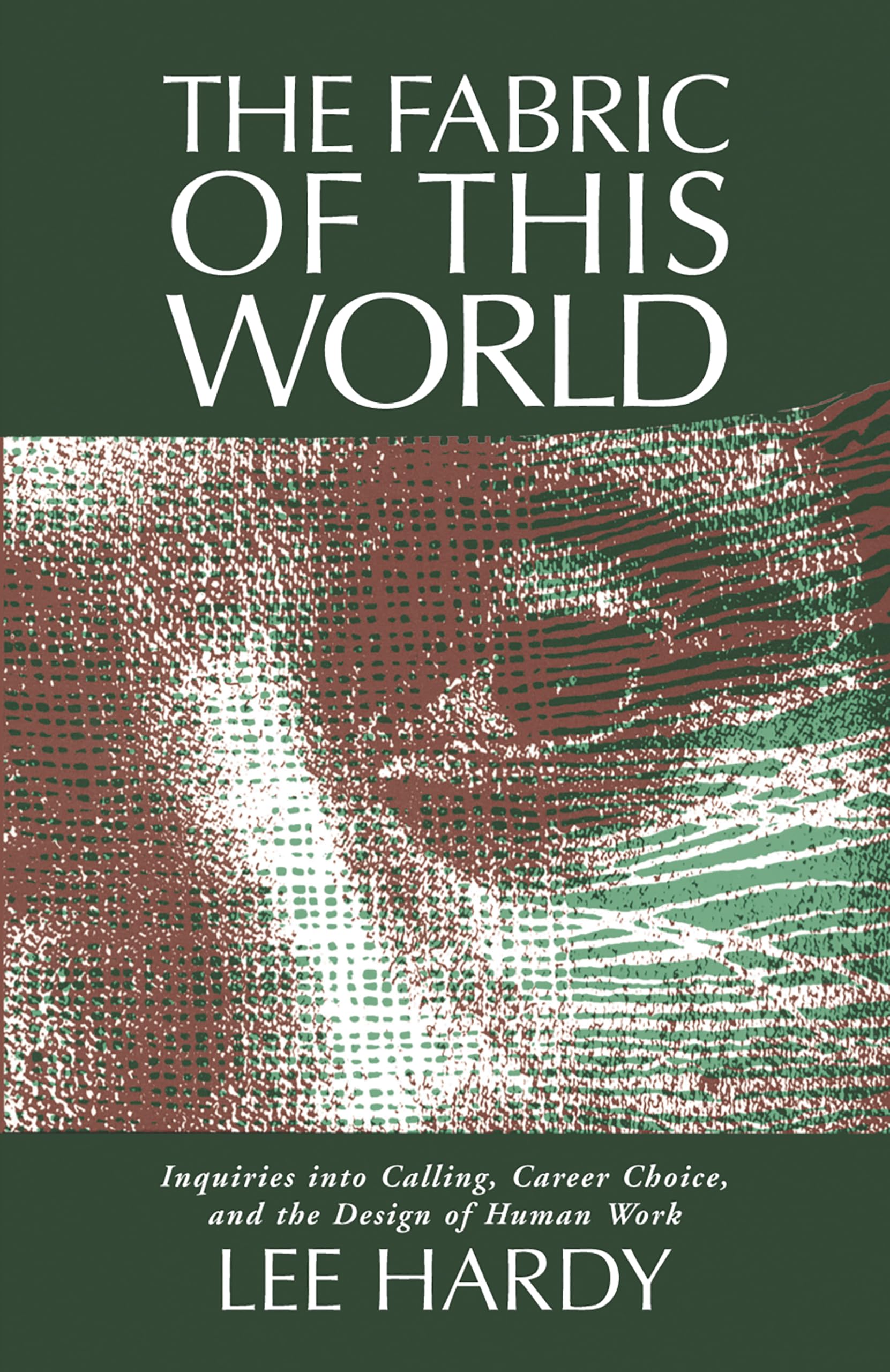
Hardy, Lee. The Fabric of This World: Inquiries into Calling, Career Choice, and the Design of Human Work.
Eerdmans: Grand Rapids, MI, 1990.
If you read much Christian writing on vocation and the theology of work, you will inevitably run across Lee Hardy’s 1990 book, The Fabric of This World, in the footnotes. I serendipitously discovered a used copy (with some great marginalia) at the City of Edmonton’s fantastic Reuse Centre, where they charge $5.00 for 50kg of anything in the store.
Having finally built up the motivation to dig in, I can report that it is an astonishing book — brief, yet wide-ranging; deep, yet succinct. Hardy’s writing is exceptionally clear, and he excels at providing precise summary snapshots of complex ideas. Where the book falters somewhat is in its effort to recommend and synthesize (a flaw, interestingly, that Hardy also levels against Frederick Taylor); however, it is nonetheless an important and foundational text for understanding the historical development of the concept of work, both within Western culture and specifically within the Protestant tradition. I wish I’d read it sooner.
Hardy opens the book with a review of cultural understandings of work from the Greeks into the early twentieth century. His argument is that, where the Greeks and the Scholastics viewed work as at best purgatorial in nature and more commonly as simply a necessity that reminds us of our resemblance to animals, since the Renaissance, a reversal has been experienced in the West, with work increasingly understood as a core — and positive — aspect of what it means to be human. While there continues to be a sense that working conditions are not what they are meant to be, the ideal state for thinkers like Marx and Freud is not simply leisure.
Hardy goes on to discuss the Protestant and post-Vatican II theology of work. Starting with Luther, Protestant thought sought to reclaim the mundane, ordinary, secular experiences of work as in fact extensions of God’s care for the world. The drudgery of the milkmaid’s occupation takes on a new significance as Luther narrates her efforts as being part of a divine continuum of Providence; it is from God, yes, but through the very service of the maid, that we receive our daily bread. Hardy deftly unpacks the elaboration of this discovery in Calvinist thought, which continues Luther’s emphasis but attends to the essential fallenness of the system of work itself. The Christian is called not only to serve God in the world, but to endeavor to change the world to reflect the will of God. Twentieth-century Catholic thought develops this thought further, framing it as an exercise of justice. (Notably, Hardy does not mention Dorothy Day, though he does provide a robust review of relevant papal encyclicals and other writing).
The second half of the book focuses on application over two chapters. The chapters have quite distinct aims. The first addresses the idea of vocation, digging down into very practical questions such as, the choice of occupation (Hardy helpfully distinguishes between occupation and vocation) and the nature of our many vocations. At a high level, this chapter was quite useful, especially in its suggestions for job choice. (First, What gifts has God given you? Second, What concerns for others has he laid on you? And third, What interests do you have?) A couple of questions go unanswered in this section pertaining to how one might distinguish between better or worse occupations. Hardy’s examples — particularly of the “rock ‘n roll” biography, which he considers a poor use of skill, versus the study into a famous choral composer, which qualifies as a good use — occasionally strike an elitist tone, rather than a Christian one. Nevertheless, this chapter contains valuable material for anyone trying to understand how they might serve God in their job.
The final chapter is quite distinct from the rest of the book, to the point that it feels like an added piece — perhaps a journal article that got too long. That being said, it covers a fascinating topic and makes good use of Hardy’s excellent capacity for summary and encapsulation. Focusing on the development of management theory from Frederick Taylor at the beginning of the twentieth century to Peter Drucker in the 70s and 80s, Hardy charts the theoretical effort to understand how people work best and the relationship between organizational ends (i.e., productivity and profit) and human ends (i.e., happiness, self-actualization, and responsibility). This chapter could be interestingly read alongside Alastair MacIntyre’s discussion and critique of management theory in After Virtue. (Perhaps this will be the subject of a subsequent post). While the chapter did not make an effort to connect the themes in the rest of the book in more than just a cursory fashion, which might have helped it to function more as a case study, it was suggestive of the need Hardy raises elsewhere to think about work at the level of system.
Nevertheless, this book represents deep and expansive thought about work and vocation, and I found myself repeatedly caught by the questions raised and concepts explored. It will continue to shape my thinking and has opened up several new avenues of investigation for me, which I anticipate pursuing on this blog. On top of everything else, the prose is a real pleasure to read. There is also a rich bibliography included, which I will definitely be making use of in the future.